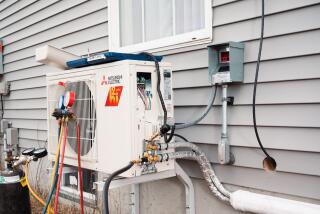RUSSIA : Moscow to Turn Up the Heat on Energy Wasters : New conservation chief aims to break a generation of Communist-style inefficiency.
- Share via
MOSCOW — When it got too hot in Galina Borovitskaya’s apartment the other day, she opened the door to the balcony to let in the frigid winter air--then forgot about it and went out shopping.
When she got back, the 40-year-old housewife berated herself for the absent-mindedness that had killed some of her windowsill plants. But at least she had no need to worry about the effect on her heating bill.
She pays 10 cents a month.
And even if she took a monthlong hot shower, she would still only pay 10 cents.
Like her entire generation, raised in the years of cheap Soviet oil and centralized Soviet control, Borovitskaya has never had to think about washing dishes more efficiently or lowering the thermostat.
In fact, she never had a thermostat to lower. Moscow’s heating system, built on the Soviet model that is among the most centralized in the world, supplies most of the heat and hot water for the city’s 30,000 apartment buildings from 15 gigantic central plants.
The winter warmth runs from substations that heat entire neighborhoods through massive pipes but that allow individual residents no way to raise or lower the heat.
If it gets too hot, they open a window. When it gets too cold, some Muscovites just light all the burners on their stoves and leave them on all day, secure in the knowledge that a typical monthly gas bill is still less than a penny.
Ah, Soviet communism. It was nice in some ways.
But it is over, said Boris A. Rekk, chief of Moscow’s new department of energy conservation, the country’s first.
“Now,” he said, “with our transition to a market economy, with the collapse of the Soviet Union, with the new shortage of fuel--the drop in oil production, the instability of coal supplies--the question of energy conservation has come into the limelight.”
According to his calculations, Muscovites pay only “a laughable 3%” of the real cost of their energy consumption.
The first step toward changing it, he said, is to bring prices closer to reality. It is a ticklish maneuver to ask Moscow’s 10 million people--already reeling under inflation that is close to 50% a month--to pay more for heat, but the city has already announced that by the end of 1994, utility fees will run 48 times higher than they are now.
The second step in making people conserve energy would logically be to put thermostats and meters in their apartments.
But there’s the rub. In what could be a metaphor for Russia’s difficulties in shifting from the collective, centralized living of communism to the individual focus of capitalism, the Soviet-built system simply cannot physically accommodate individual apartment heat controls.
In a typical Soviet building, one big pipe heats a series of apartments from bottom to top. It cannot be controlled by individual apartments; it cannot even be managed well enough to keep some lower floors from being chronically overheated and some upper floors from being chronically cold.
At best, Rekk said, the city can make new buildings more energy-efficient and put meters in each apartment house. With the meters, Rekk said, it will be up to the residents, who split the monthly bill, to try to keep expenses low.
Honeywell Inc., the Minneapolis-based automation giant, is helping with a $3-million project in Moscow’s Tushino district to improve the heating system for an expected saving of up to 20%.
If all goes as planned, Rekk hopes that Moscow can cut its overall energy use by 10% to 15% over the next 15 years--no small feat for a city that uses 30 billion cubic meters of gas, 2 million tons of coal and 3 million tons of fuel oil a year.
But is Moscow ready to conserve?
“It will be awfully hard to change,” Borovitskaya said. “I’m afraid no meters in the house or apartment will alter me. I’m too spoiled already to start thinking about saving hot water all of a sudden. And I have enough other headaches.”
Power for Mere Pennies
The monthly bills paid by Vladimir Ivashkevich, a 67-year-old design consultant with a two-room apartment, illustrate the tiny sums Muscovites pay for utilities . Even allowing for the fact that the average monthly salary in Russia is only 13,000 rubles, or $26, these are cheap rates.
In rubles In cents Central heat 56 11 Hot water 37 7 Cold water 18 4 Gas 2 1/2 cent Phone fee 42 9
Source: Sergei Loiko, The Times’ Moscow Bureau
More to Read
Sign up for Essential California
The most important California stories and recommendations in your inbox every morning.
You may occasionally receive promotional content from the Los Angeles Times.













